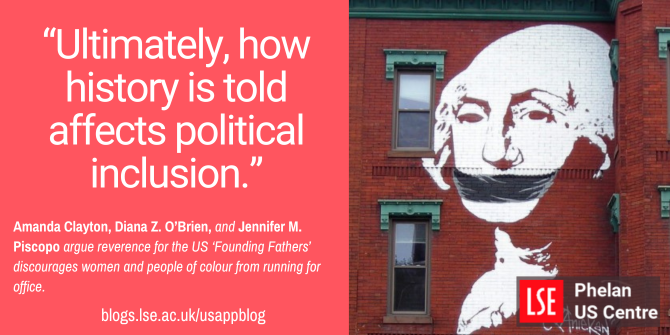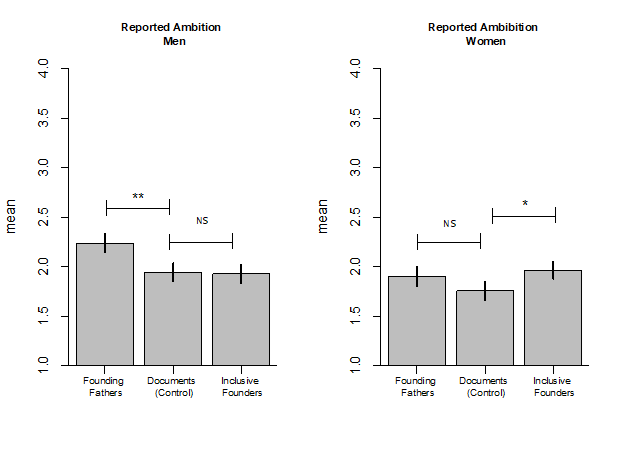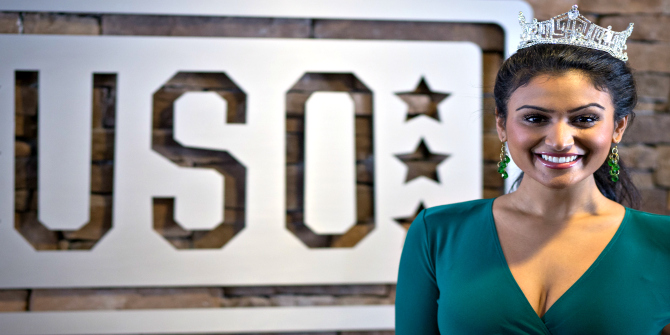

 Women remain underrepresented in politics in the US and across the globe, with many scholars and commentators suggesting that this is due to women’s lower political ambition compared to men. In new research, Amanda Clayton, Diana Z. O’Brien, and Jennifer M. Piscopo argue that the problem is not that women have too little political ambition, but that men have too much. They show that when citizens are reminded of countries’ founding narratives that emphasise ‘great men doing great things’, men are much more likely than women to express an interest in running for political office.
Women remain underrepresented in politics in the US and across the globe, with many scholars and commentators suggesting that this is due to women’s lower political ambition compared to men. In new research, Amanda Clayton, Diana Z. O’Brien, and Jennifer M. Piscopo argue that the problem is not that women have too little political ambition, but that men have too much. They show that when citizens are reminded of countries’ founding narratives that emphasise ‘great men doing great things’, men are much more likely than women to express an interest in running for political office.
Why women remain underrepresented in elected office is an enduring question in gender and politics research. Many scholars and commentators point to a gender gap in political ambition, where women express less interest in running for office than men. Our new research flips the question – rather than asking why women have so little ambition, we ask: Why do men have so much?
We show that how politics is portrayed affects which groups see themselves as political leaders. The images, narratives, and symbols of politics all send the message that politics is a place where great men accomplish great things. In the United States, this message is sent via reverence for the ‘Founding Fathers’: the celebration of the men – like George Washington, Thomas Jefferson, and Alexander Hamilton – who played leading roles in US independence and early government in the late 18th and early 19th centuries.
In our study, reminding people about the Founding Fathers’ achievements increased political ambition among white men, but not among men of colour or women. Who gets memorialised in countries’ founding narratives matters for the present day, with national origin stories encouraging white men to see themselves as especially suited for politics.
Founding narratives and politics as a space of male greatness
Our study departs from the claim that the founding narrative of the United States reinforces perceptions that politics is a place of male greatness. The heroic deeds of the US Founding Fathers are memorialised in countless ways: in textbooks, on money, in the names of schools and cities and states—and even in the international blockbuster musical, Hamilton.

“Silenced George Washington mural, U Stre” (CC BY-NC-ND 2.0) by BeyondDC
Contemporary politicians invoke the Founding Fathers to legitimise their campaign bids. In our analysis of 57 presidential campaign announcement speeches from the 2016 and 2020 US elections, 24 of the speeches—the vast majority made by men—referenced the Founding Fathers.
Take Republican congressman Ted Cruz, who in his 2015 presidential campaign announcement speech, asked the audience to imagine the courage of those signing the 1776 Declaration of Independence; then to imagine the courage of George Washington ‘fighting for freedom’; and then to support Cruz in his campaign to ‘stand with liberty’. The Founding Fathers’ legacy inspires men like Cruz, who then position themselves as its inheritors.
Two-minute civics
To capture how narratives about the Founding Fathers can affect men’s and women’s ambition, we designed a survey experiment that mimicked how Americans are routinely exposed to this historical narrative. We combined images and narratives to make videos of ‘two-minutes civics lessons’.
We made three videos. First, the ‘Founding Fathers’ video details the accomplishments of George Washington, Thomas Jefferson, and Alexander Hamilton, alongside Frederick Douglass, the most famous abolitionist in early American political history. By including Douglass, a formerly enslaved man, we avoided showing only white men, thus strengthening gender cues associated with the Founding Fathers’ maleness (and muting any racial cues associated with the fact that most were white).
The second video, ‘Inclusive Founders’, keeps the stories of Jefferson and Douglass, but swaps in two women for Washington and Hamilton: Abigail Adams (wife of the second US president John Adams) and Susan B. Anthony (a noted suffragist). The third ‘Historic Documents’ video features no individuals, and instead describes four well-known texts (the Declaration of Independence, the US Constitution, the Bill of Rights, and the Emancipation Proclamation).
Respondents saw only one of the three videos, but all answered the same questions about their attitudes towards running for political office in the future. Figure 1 combines their answers into a four-point scale ranging from least ambition to most ambition and displays our results. We find that men express significantly more political ambition after the watching the Founding Fathers video when compared to both the Inclusive Founders video and the Historic Documents video.
Figure 1 – Men’s and women’s political ambition after viewing the two-minute civics videos

These results hold among white men, but not among men of colour. Similarly, women experience no ambition boost from watching the Founding Fathers video relative to the other two, though they do report significantly more ambition after watching the Inclusive Founders video relative to the Historic Documents video.
To illustrate the effect of the Founding Fathers’ video on men’s ambition, compare their responses on the item, ‘I would not rule running for office out forever, but I currently have no interest’. Twenty percent of men respondents who watched the Historic Documents video chose this option, compared to 33 percent of men who watched the Founding Fathers video.
Great Men Narratives Matter
In a second study, we examined whether American men are responding to the maleness of politics generally or the Founding Fathers’ greatness specifically. We designed a fourth two-minute civic video, this one focusing on the achievements of four lesser-known figures: George Read, Oliver Wolcott, David Rittenhouse, and David Walker. These men were the Founding Fathers’ contemporaries and performed similar tasks (i.e., Walker was also an abolitionist leader), but they receive far less attention in the US’ origin story.
We showed a new group of men survey respondents either the Historic Documents video or this ‘Early Statesman video’. In contrast to the Founding Fathers video, the Early Statesman video produced no ambition bump relative to the Historic Documents video. We conclude that it is the memorialisation of great men—the specific figures of the Founding Fathers—that leads everyday American men to perceive that politics is a place where they belong.
Our research demonstrates that how history is told matters for who see themselves as able to govern. We show that male political symbols contribute to men’s over-representation in politics.
Ultimately, how history is told affects political inclusion. Campaigns to remove statues of racist figures or to memorialise the accomplishments of women and people of colour are therefore not just political correctness gone awry, but efforts to create new symbols that resonate among an ever-more diverse populace.
- This article is based on the paper, ‘Founding Narratives and Men’s Political Ambition:Experimental Evidence from US Civics Lessons’, in the British Journal of Political Science.
- The data and replication code for this research is available here.
- Please read our comments policy before commenting.
- Note: This article gives the views of the author, and not the position of USAPP – American Politics and Policy, nor the London School of Economics.
- Shortened URL for this post: https://bit.ly/3TrybD7






